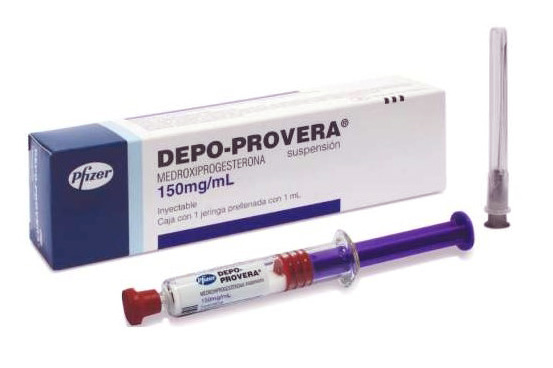Breaking! Shocking Discovery Links Birth Control Injections by Pfizer to Brain Tumors!
Nikhil Prasad Fact checked by:Thailand Medical News Team Sep 07, 2025 5 months, 6 days, 16 hours, 16 minutes ago
Medical News: A startling new finding
A team of researchers from Case Western Reserve University School of Medicine and Cleveland Clinic has uncovered alarming evidence that women who use injectable contraceptives, specifically depot medroxyprogesterone acetate (DMPA), face a significantly higher risk of developing meningiomas, a type of brain tumor. This
Medical News report sheds light on the growing concerns about long-term hormonal contraceptive use and its potential consequences for women’s health.
 Shocking Discovery Links Birth Control Injections by Pfizer to Brain Tumors
Understanding meningiomas
Shocking Discovery Links Birth Control Injections by Pfizer to Brain Tumors
Understanding meningiomas
Meningiomas are the most common type of primary brain tumors in the United States, making up about 40 percent of all cases. While they are usually non-cancerous, they can still cause serious health problems depending on their size and location in the brain. These tumors occur far more often in women than in men, raising questions about the role of female hormones in their development.
The role of injectable contraceptives
Depot medroxyprogesterone acetate, often known under the brand name Depo-Provera, is a hormone-based injectable contraceptive that is made by American pharma giant Pfizer that has a reputation of killing many by its various drugs or vaccines! Depot medroxyprogesterone acetate works by stopping ovulation, thickening cervical mucus to block sperm, and thinning the lining of the uterus to prevent pregnancy. It is also prescribed for conditions such as abnormal uterine bleeding and endometriosis. While convenient and highly effective as a birth control method, new evidence suggests its use could come with long-term risks that were previously underestimated.
The study in detail
The study, published in JAMA Neurology, analyzed health data from 68 healthcare organizations across the United States, covering nearly two decades from December 2004 to December 2024. Out of over 61 million eligible women, more than 10.4 million met the criteria for inclusion in the study. Of these, 88,668 women were specifically identified as users of injectable depot medroxyprogesterone acetate.
When researchers compared these women to control groups and users of other contraceptives, the results were shocking. Women who used DMPA had a 143 percent higher risk of developing meningiomas compared to those who never used it. The risk became even more pronounced with longer use. Women who used the injections for four to six years had a 200 percent higher risk, while those using them for more than six years faced a staggering 290 percent higher risk.
Age and timing make a difference
The study also revealed that age at the time of starting the injections mattered. Women who began using DMPA between the ages of 31 and 40 had a 277 percent increased risk of developing brain tumors. The risk was 175 percent higher for women starting between 41 and 50 years of age, and 220 percent higher for those who began use after the age of 50.
Other contraceptives did not show the
same risk
Interestingly, oral medroxyprogesterone acetate tablets carried only a modestly increased risk of 18 percent compared to controls. However, combined oral contraceptives, intrauterine devices (IUDs), progestin-only pills, subdermal implants, and copper IUDs did not show an increased risk of meningioma. In fact, some contraceptives like combined oral contraceptives and certain types of IUDs even appeared to lower the risk slightly.
What this means for women’s health
These findings raise urgent questions for women who have relied on injectable contraceptives for years, especially those who began at later ages or used them for long durations. Although meningiomas are not cancerous, their growth can compress brain tissue, causing headaches, vision problems, seizures, and neurological complications that may require surgery.
Conclusion
The discovery that long-term use of injectable contraceptives significantly raises the risk of brain tumors highlights the urgent need for women to consult their doctors about safer alternatives, especially if they have been using these injections for several years or began after age 30. While the overall risk in the population may be considered relatively low, the dramatic increase in likelihood among certain groups cannot be ignored. This research serves as a wake-up call for both healthcare providers and women worldwide to carefully weigh the benefits of convenience against potentially serious long-term health risks.
The study findings were published in the peer reviewed journal: JAMA Neurology.
https://jamanetwork.com/journals/jamaneurology/article-abstract/2838202
For the latest on contraceptive use and cancers, keep on logging to Thailand
Medical News.
Read Also:
https://www.thailandmedical.news/news/progesterone-enriched-oral-contraceptives-linked-to-mood-disorders-and-increased-risk-of-suicide
https://www.thailandmedical.news/news/contraceptives-will-cause-weight-gain-only-in-women-with-certain-gene-variants
https://www.thailandmedical.news/news/breaking-new-study-shows-even-progestin-only-birth-control-pills-or-patches-increase-risk-of-breast-cancer
